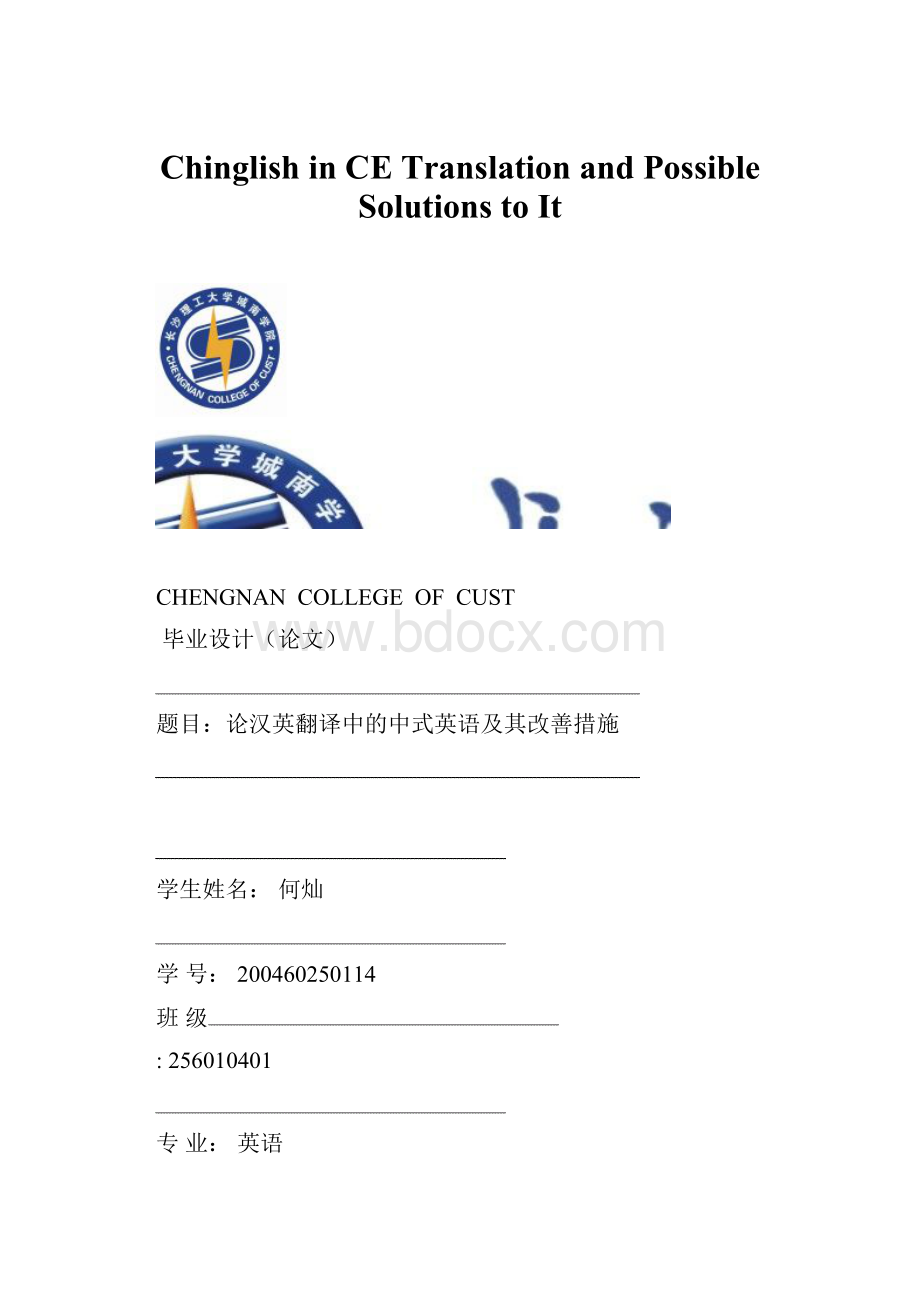Chinglish in CE Translation and Possible Solutions to ItWord文档格式.docx
《Chinglish in CE Translation and Possible Solutions to ItWord文档格式.docx》由会员分享,可在线阅读,更多相关《Chinglish in CE Translation and Possible Solutions to ItWord文档格式.docx(23页珍藏版)》请在冰豆网上搜索。

200460250114
班级
:
256010401
专业:
英语
指导教师:
曾成栋
2008年6月
GRADUATIONTHESIS
(Grade2004)
CHINGLISHINCHINESE-ENGLISHTRANSLATION
ANDPOSSIBLESOLUTIONSTOIT
Name:
HeCan
Number:
200460250114
Class:
Tutor:
ZengChengdong
Department:
SchoolofForeignLanguages
DateofCompletion:
June9,2008
摘要
随着我国改革开放和全球经济一体化,我国与其他国家之间的交流与沟通越来越频繁。
英语已发展为一门世界性语言,并成为我国对外交流的主要工具;
而翻译便成为必要的交流形式。
然而,在翻译过程中普遍存在“中式英语”的现象。
译者拘泥于原文字面,“对号入座”,使得译文生硬晦涩,不符合英语规则或习惯表达,并带有明显的汉语特征,因而不能被以英语为母语者所接受。
它的存在严重影响了翻译的质量以及我国的对外交流,从而影响了我国的国际身份与地位。
针对这一问题,本课题对中式英语进行了较系统的研究,旨在给中国英语学习者一个借鉴,以期在翻译过程中尽量减少使用中式英语,提高汉英翻译质量。
本课题共分为三大部分。
第一部分对中式英语进行了一个概述,给出其定义,并利用对比分析指出其产生的根本原因,即中西思维模式的差异以及母语的干扰;
第二部分从六种错误类型,通过大量例子,较详细地描述了汉英翻译中的中式英语的主要表现形式;
第三部分针对中式英语的产生原因及表现形式,提出了三大改善措施,以期减少和避免汉英翻译中中式英语的现象。
关键词:
中式英语;
思维模式差异;
母语的干扰;
汉英翻译
ABSTRACT
Withthereformandopening-upofChinaandeconomicglobalization,Chinesepeoplearecommunicatingwithothercountriesmorefrequently.Englishthathasdevelopedasaworldwidelanguagehasbecomeourmaintooltofulfillinternationalcommunication,andtranslationhasbecomeanecessarymethod.However,aphenomenonexistscommonlyinChinese-Englishtranslation,thatis,Chinglish.Thetranslatorsjustrigidlysticktooriginalwords,andtheirtranslationsturnouttobeobscureandnotconsistentwithEnglishhabitsorrulesbutwithChinesecharacteristics,whichcannotbeacceptedbyEnglishnativespeakers[1].Consequently,Chinglishseriouslyaffectsthetranslationquality,ourcommunicationwiththeworldandtheinternationalstatusofourcountry.
ThispaperisanattempttostudyChinglishinChinese-Englishtranslation.Bythewayofcontrastiveanalysis,itanalyzesmaincausesandformsofChinglish,forthepurposeofhelpingChineseEnglishlearnershaveaclearercognitionofChinglishandavoiditintranslationasmuchaspossible.Itconsistsofthreeparts.PartonedescribesChinglishwithinterlanguageandanalyzesthebasiccausesofChinglishthatarethoughtpatterndifferencebetweenChineseandEnglishandinterferenceofmothertongue.Fromtheaspectsofsixsortsoferrors,parttwodemonstratesmainmanifestationsofChinglishinC-Etranslationwithalargenumberofexamples.PartthreeofferssomepossiblesolutionswithanaimtoreduceorevadeChinglishinChinese-Englishtranslationtothelargestextent.
Keywords:
Chinglish;
thoughtpatterndifference;
mothertongueinterference;
Chinese-Englishtranslation
Contents
Introduction1
1Chinglish2
1.1DefinitionofChinglish………………………………………………………………2
1.2BasicCausesofChinglish3
1.2.1ThoughtPatternsDifferences3
1.2.2MotherTongueInterference5
2ManifestationsofChinglishinChinese-EnglishTranslation7
2.1RigidTranslation7
2.2UnnecessaryWords7
2.3MisuseofWords9
2.4IncorrectWordOrder11
2.5IncorrectSubject12
2.6IncorrectNegation13
3PossibleSolutionstoChinglishinChinese-EnglishTranslation15
3.1KnowingMoreaboutEnglishThoughtPatterns15
3.2AccumulatingChinglishExamples16
3.3DoingMoreTranslationPractice16
Conclusion18
Bibliography19
Acknowledgements20
Introduction
SinceEnglishhasdevelopedasaninternationallanguage,studyonvariousEnglishversionsonthelinguistics,cultureandcognitionhasbecomeasignificantsubjectintheinternationallanguagestudyfield.
ScholarshomeandabroadhavebeendevotingthemselvestostudyingChinglishforyears.LiWenzhongdistinguishedChinaEnglishfromChineseEnglish.HethoughtthatChinaEnglishwasnotahypothesisbutanobjectivephenomenonwithexpansiveprospectandstudyvalue,whileChineseEnglishwasdistortedEnglishandwouldbegraduallyreducedoreradicatedalongwiththewideuseofEnglishandChineseEnglishlearners’constantexaminationoftheEnglishusedbythemselves.Onthebasisofinterlanguage,LinQiongputforwardthatbothChinaEnglishandChinglishwereinterlanguagevariationsproducedbyChineseandaffectedbyChineselanguageculture,andtheywereinevitable.ZhuangYichuanstatedthatthereweretworeasonsofChinglish.Onewasmisunderstandingoftheoriginal,andtheotherwasbeingnotfamiliarwithEnglishcharacteristicsandadoptingChinesecollocationsandstructures.JoanPinkham,anAmericanprofessionaltranslator,systematicallyclassifiedChinglishmanifestationsandcorrectedthemwithspecificanalysis[2].
TheauthorofthispaperagreesthatChinglishisobjectiveandunavoidableforChineseEnglishlearnersbutneedsimprovement.ThispaperstudiesChinglishinChinese-Englishtranslation,discussingitsdefinition,causesandsolutionswithalargenumberofexamples.
1Chinglish
Chinglishhasalreadyexistedbeforeliberation,evensinceChinesebegantostudyanduseEnglish.Intheearly1980s,someforeignexpertspointedoutthatsomephrasesorstructuresinsomepublishedChinesemagazinesandnewspapersdidnotconformtostandardEnglishactually.BecauseitmanifestsChinesefeature,theycalledthiskindofEnglish“Chinglish”(ChineseEnglish)[2].
Awell-knowntranslator,PeterNewmark,consideredthat,“Hewhowritesorspeaksinaforeignlanguagewillbe‘caught’outeverytime,notbygrammar,whichisprobablysuspiciously‘better’thananeducatednative,notbyhisvocabulary,whichmaywellbewider,butbyhisunacceptableorimpropercollocations[3].”ForChinesepeoplewhatPetertalkedaboutisChinglish.
DefinitionofChinglish
ChinglishisdefinedcomprehensivelybyJoanPinkhamwhoisanAmericanlanguageexpertinherbookTheTranslator’sGuidetoChinglish:
“Chinglish,ofcourse,isthatmisshapen,hybridlanguagethatisneitherEnglishnorChinesebutthatmightbedescribedas‘EnglishwithChinesecharacteristics’”.[4]ItdoesnotconformtostandardEnglishandcannotbeunderstoodoracceptedbyEnglishnativespeakers,soitisnotplayingagoodroleincommunicatingwithEnglishpeople.
Inthestrictsense,ChinglishistheinterlanguageofChineselearnersbetweenChineseandEnglish.ProposedbyS.PitCorderandLarrySelinker,theconceptofinterlanguagewasestablishedaslearners’independentsystemofthesecondlanguagewhichisneitherthenativelanguagenorthesecondlanguage,butacontinuumorapproximationfromhisnativelanguagetothetargetlanguage[5].Twoofthecharacteristicsofinterlanguagearecited:
(1)Itisdynamic,andfulloferrors,andisintheprocessofconstantchangetowardsastandardtargetlanguagesystem.
(2)Thelearner’scompetenceistransitional.Itissubjecttoconstantrevision,passesthroughanumberofstages,andformsthe“interlanguagecontinuum”.
Anotherfeatureisfossilizationwhichisdefinedasaprocessoccurringfromtimetotimeinwhichincorrectlinguisticfeaturesbecomeapermanentpartofthewayapersonspeaksorwritesalanguage[5].BeingChinese,wegenerallycannotreachthesamelevelofcompetenceasEnglishnatives.Our“finalstate”grammarisnotstandardEnglishgrammar.Thus,certainrulesanditems“fossilize”.Typicalerrorsare“hehave…”and“shegotoschoolyesterday”,etc.
AccordingtothedefinitionsofChinglishandinterlanguageandthecharacteristicsofinterlanguage,aconclusioncanbedrawnthatChinglishisaninterlanguageofChineselearnersofEnglish,andisneitherChinesenorEnglishbutstandsbetweenthem.
BasicCausesofChinglish
TherearenumerousreasonsthatwillleadtoChinglishinC-Etranslation.Firstly,lotsofnewwordsappearinChinaandtheycannotbefoundinChinese-Englishdictionaries.Secondly,ChineseandEnglishthoughtpatternsandculturearedifferent.Thirdly,ChinesehavefewchancestoknowidiomaticEnglish.Fourthly,ChinesepeoplearemoreproficientinChinesethaninEnglish.Fifthly,notalltheEnglishteachersareEnglishnatives.Generallyspeaking,ChineseteachersuseChinglishmoreorless,sotheywillsurelytransferChinglishtotheirstudents.Sixthly,whentranslating,ChinesepeopledonotadoptthestructureofEnglishbutChinese.Lastbutnotleast,lackofvocabularymayalsocauseChinglish.
Asamatteroffact,therearetwobasiccausesofChinglish.Oneisthoughtpatternsdifferences.Theotherismothertongueinterference.
1.2.1ThoughtPatternsDifferences
Itisgenerallyacknowledgedthatthoughtiscloselyrelatedtolanguage.Ontheonehand,thewayofthinkingdeterminesthewayoflanguageexpressing.Ontheotherhand,language,athinkingvehicle,reflectsthinking.Thecentralpartofwayofthinkingisthoughtpattern.Therefore,thoughtpatterninfluenceslanguageessentially.ChinaisfarfromEnglishspeakingcountries.Owingtodifferentculturesandhistoricalbackgrounds,peopleinthesecountrieshavedifferenthabitsandthoughtpatterns.Accordingly,itisthedifferencebetweenChineseandEnglishthoughtpatternsthatbasicallycontributetothearisingofChinglish.Thethoughtpatterndifferencesmainlyembodythefollowingfiveaspects.
(1)Differenceofemphasisonindividualorgeneral
Westernpeopleemphasizeonindividual,whileChinesepaymoreattentiontothegeneral.Englishfollowtheprincipleof“individualliesbeforegeneral[6]”.Takenamesofhumanandplacesforexample.Therulesare“givennamestandsbeforefamilyname”and“smallerunitstandsbeforebiggerunit”.IntheEnglishname“TomSmith”“Tom”isthegivennameand“Smith”isthefamilyname.However,intheChinesename,thefamilynameisbeforethegivenname.Forinstance,张小华,张isthefamilynameand小华isthegi